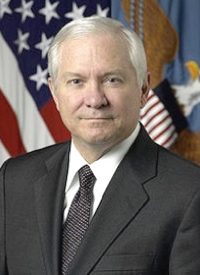
As the deadline for complete withdrawal approaches, Defense Secretary Robert Gates (left) is soliciting permission from the government of Iraq for American troops to remain in the country in 2012. Predictably, Gates cited “stability” and “reassuring the Gulf States” that they would be safe from Iran as legitimate reasons for a continuing American military presence in Iraq.
Gates, accustomed to pre-emptive strikes in Iraq, decided to begin the campaign to secure the extension as it was becoming apparent that Baghdad wasn’t hurrying along the path of petitioning the Obama administration for its approval of an extension of the time for troop presence in that country.
In an extraordinary bit of policy passive-aggression, Secretary Gates said that the U.S. would likely agree to Iraq’s request for an extension “to send a message to American allies and Iran that the U.S. isn’t withdrawing from the region.”
"It would be reassuring to the Gulf States. It would not be reassuring to Iran, and that is a good thing," Mr. Gates told the audience at a recent American Enterprise Institute presentation.
Naturally, Gates (and his boss in the Oval Office) were able to trot out “Middle East experts” to provide intellectual support for their desire to keep American soldiers and sailors in Iraq.
On Tuesday, Frederick Kagan, frequent contributor to Foreign Affairs, the mouthpiece of the Council on Foreign Relations, described as “an influential defense analyst,” warned in a report that if the United States were to withdraw its armed forces from Iraq, Iraq would either be continually plagued by “insurgent-style attacks from Iran-backed proxies” or worse, it would be left a defenseless quarry likely to be attacked and by regional predator, Iran.
"The Iraqi Security Forces will not be able to defend Iraq’s sovereignty, independence from Iran, and internal stability without American assistance, including some ground forces, for a number of years," Mr. Kagan wrote in his sympathetic report.
Not overlooking the tragic fact that two American soldiers were killed Sunday by a roadside bomb in Baghdad, Gates reasoned that these servicemen (and the other 4,452 Americans who have died in Iraq since the war began in March 2003) would be in vain if America didn’t remain in Iraq as an “investment in treasure and lives.”
Ready with the cart just in case the horse comes around, reports indicate that the Pentagon has developed plans to deploy two brigades and a division headquarters into Iraq this summer. As the Wall Street Journal so aptly assessed it, these contingencies are “a move that would position the U.S. to maintain a substantial force in the country should Baghdad request an extension.”
What does the Iraqi government think of Secretary Gates’s assessment of its need for American protection from Iran?
From the Wall Street Journal article:
Many Iraqi lawmakers say they believe there is a parliamentary majority in Iraq supporting a continued U.S. troop presence. But the influential pro-Iranian cleric, Moqtada al Sadr, is pushing lawmakers to block a request.
Some Iraqi officials have said privately that Prime Minister Nouri al-Maliki supports keeping U.S. troops, but he won his current term with the backing of Mr. Sadr’s supporters.
That hopeful tone isn’t struck by the coverage of the story published by Al Jazeera online. The piece reports on the reaction to Gates’s proposal in Iraq among followers of Muqtada al-Sadr, a group crucial to maintaining the control of the ruling coalition of Iraqi Prime Minister Nuri Kamal al-Maliki.
Thousands of supporters of Shia cleric Muqtada al-Sadr have ralled in the Iraqi capital, Baghdad, in a show of force against any extension of US military presence in the country past a year-end deadline.
Al Jazeera’s Omar Al Saleh, reporting from Baghdad, on Thursday said members of al-Sadr’s Mahdi army "converged at Sadr City" , the northeastern Baghdad neighbourhood named after the cleric’s father, "at early hours of the morning".
According to our correspondent, the cleric’s loyalists staged a peaceful protest, marching without carrying weapons, but this was no cause for relief.
"They have a message aimed at Americans: if you stay beyond the deadline set by the SOFA agreement, the security agreement signed between the US and Iraq – if they stay beyond that date which is 31 of December, the end of this year, the Mahdi army will resume its military activities and they wiill battle US forces," Al Saleh said.
Al Saleh said some protesters who spoke off camera said they have their weapons at home and that they were ready "at any moment that the cleric Muqtada al-Sadr gives his orders", to pick up arms and "fight the Americans".
"… this is a sign for worry to the Iraqi government and to the US military," Saleh said. "We actually received a statement of a senior US military general here in Iraq [saying that] it’s no comfort that an illegal militia threatens to reactivate its forces and start bloodshed and fighting."
As is typically the case with decisions affecting the expansion of the American empire, there is no time to waste in nailing down the obedience of the suzerainties. "Time is your enemy," said a senior military official.
Again from the Wall Street Journal:
Officials have said the U.S. military is four months away from a logistical point-of-no-return, when it would need to begin the final dismantling of remaining military installations and sending equipment out of the country to withdraw on time.
With his re-election looming, President Obama must choose between alienating those in his base that will decry his breaking of a 2008 campaign promise to completely withdraw U.S. forces from Iraq on the one hand, and maintaining an armed American presence in the Middle Eastern outpost of the American empire over which he presides.



